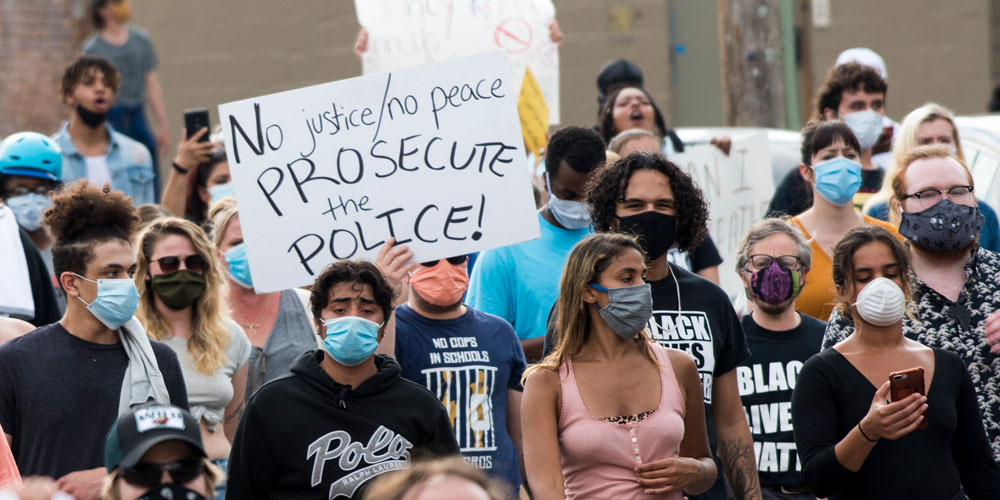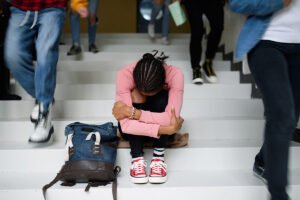
June 26, 2020; Guardian
A comprehensive 100-page study by the University of Chicago Law School International Human Rights clinic, titled Deadly Discretion: The Failure of Police Use of Force Policies to Meet Fundamental International Human Rights Law and Standards, found that of the police departments in the 20 most populous US cities, “not a single police department was operating under guidelines that are compliant with the minimum standards laid out under international human rights laws.”
For their study, the authors examined use of lethal force policies from police departments in the 20 largest US cities by population in 2018. This data was analyzed with a grading system developed with international law standards, including the United Nations (UN) Code of Conduct for Law Enforcement Officials, UN Basic Principles on the Use of Forces and Firearms by Law Enforcement Officials, and the 2014 report by the then-UN Special Rapporteur on extrajudicial or arbitrary executions.
The study overwhelmingly found US police forces fail to meet fundamental international human rights laws and standards. Not a single department was operating under the guidelines with the minimum standards laid out under international human rights, resulting in more death, violent techniques used abundantly, lack of de-escalation measures, and inadequate accountability structures when death occurs.
Of the 20 cities evaluated, Los Angeles and Chicago were closest to complying with human rights standards because they require external investigations when lethal force is deployed. The lowest scoring city was Indianapolis, with the study using data during Vice President Mike Pence’s tenure as governor. The Indianapolis police department was found to have breached multiple human rights standards such as poor accountability structures in proportion to lethal force, as well as allowing for deadly force for a “forcible felony” without limiting or specifying what were relevant felonies.
Sign up for our free newsletters
Subscribe to NPQ's newsletters to have our top stories delivered directly to your inbox.
By signing up, you agree to our privacy policy and terms of use, and to receive messages from NPQ and our partners.
In response to their findings, the authors put together a list of 20 recommendations to bring US cities into compliance and address core issues of legality, necessity, proportionality, and accountability. These included a legal requirement from Congress for de-escalation techniques for all threats posed to officers, elimination of “no knock” warrants, removal of qualified immunity, full reporting to independent civilian oversight bodies, and even the UN General Assembly convening a high-level meeting to address police abuse of human rights around the world. This last recommendation, as NPQ covered, actually happened at the UN Human Rights Council earlier this month in response to a petition from 54 African nations responding to the police murder of George Floyd. The UN has now committed to a year-long formal inquiry to investigate systemic racism against people of African descent, although the name of the US was intentionally omitted from the resolution.
The University of Chicago study’s findings form part of a larger body of advocacy work that aims to address various forms of US state-sanctioned violence. Human rights experts such as Agnès Callamard, who led the UN inquiry on the 2018 murder of Saudi journalist Jamal Khashoggi, are urging US authorities to listen to the demands of protesters, and mentioned they are “horrified because we are watching people dying in public at the hands of those who are supposed to protect us.”
This work is gaining more national and international attention, resulting in real-time changes outside of local and national legislation. A recent New York Times investigation highlighted discrepancies in the Philadelphia Police Department’s narrative of their attack on peaceful protesters on I-676. This release was quickly met by an apology statement from Mayor Jim Kenney and a moratorium from Police Commissioner Danielle Outlaw on tear gas, after the two of them had defended the PPD’s usage of tear gas and force 20 days prior. The highest indictment of the law enforcement involved was a demotion of the police captain, with an unclear number of officers receiving 30-day suspensions. No one can say how far current mayors, legislators, and leaders of large institutions will go to address incidents like these, which have been recorded in over 100 US cities since late May.
Amnesty International recently released findings based on 125 recorded cases of police violence directed at protesters from May 26th to June 5th, 2020. These were used to create a public interactive map highlighting human rights violations on American streets in 40 states.
This body of advocacy work will undoubtedly continue to grow, as supporters aim to enact larger structural and cultural changes. Ernest Coverson, the End Gun Violence Campaign Manager for Amnesty International, says, “Giving law enforcement weapons of war creates an endless cycle of violence that disproportionately affects Black people. We are a society that has chosen to let law enforcement kill Black people in near-total impunity and attack protesters who peacefully exercised their right to speak up against these human rights abuses. This research shows that the police will stop at nothing to squash protesters. No one had to lose their eyesight, get sick, or forever fear the police because they wanted to say that Black lives matter. It’s time to end these human rights violations once and for all.”—Chris Cannito










